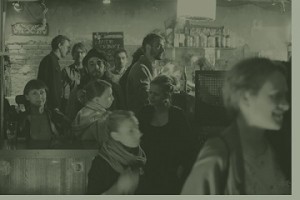ESSAYS
Danielle Fuller
DeNel Rehberg Sedo
Bar Crowd. Photo by Jonathan Adami
Photo by Jonathan Adami
In our hyperdigital era, mass reading events provide opportunities for human interaction via a socially networked event that can be engaged online and offline, either once or repeatedly. These encounters may well be ephemeral, but they are capable of producing significant moments of identification or affective connection among participants.
Consider the following situations: We live in an era where people can communicate their ideas and feelings instantly to their friends via social media. At least we can if we have access to such devices as smartphones and tablets, and to communications technologies like 3G or broadband. Connecting with others so easily and sharing experiences—whether unique or mundane—is, we might say, a boon of our times, especially if we live our lives on a different continent from family and friends. We can socialize and be sociable across time and space faster and more frequently than we could even a decade ago.
Many readers enjoy exchanging their book recommendations, talking about the books they have read, and, given the opportunity, joining in conversations with successful writers. All of these ways of sharing reading have a long history in Europe and North America. They now occur both face-to-face and online, the latter sometimes enabled by the same platforms and devices mentioned above. And all of these reading practices are profoundly social acts.
Now contrast these two realities with Colin Robinson’s recent New York Times opinion piece in which he laments the difficulties facing the contemporary reader of books. “Today,” declares Robinson, “with our powers of concentration atrophied by the staccato communication of the Internet and attention easily diverted to addictive entertainment on our phones and tablets, book-length reading is harder [than ever].” Robinson goes on to argue that book reading is, moreover, a lonely endeavor because of the decrease in professional reading advisors such as reviewers who can provide “guidance,” the decline (in the US) of library use, and the shrinking quantities of publishers’ “midlist” titles.

